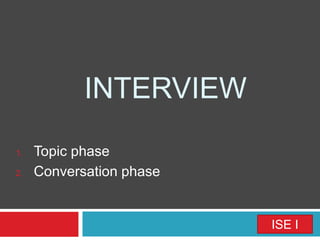
PROCEDURE FOR THE INTERVIEW. ISE I
- 1. INTERVIEW 1. Topic phase 2. Conversation phase ISE I
- 2. Communicative skills: topic phase Show understanding of the examiner by responding appropriately to questions. Give information about the prepared topic in a series of sustained turns under the four discussion points on the Topic form. Make the sequence of events clear by referring back to previous events and forward to forthcoming events.
- 3. Communicative skills: topic phase Answer questions on the prepared topic, and participate in informal discussion of the topic, responding to the examiner’s requests for more information, facts or details. Ask the examiner at least one question about the topic area. Take the opportunity provided to include samples of the language functions and language items listed for ISE I, where
- 4. Communicative phase: conversation phase Show understanding of the examiner by responding appropriately to questions. Provide information and offer opinions where appropriate. Start to play a limited part in initiating and maintaining the conversation. Ask the examiner at least one question related to the portfolio and at least one question about the subject area. Discuss the contents of the portfolio.
- 5. 1. Topic phase The examiner asks the candidate for the Topic form and the candidate tells the examiner what he or she is going to talk about. During the Topic phase the examiner randomly selects one of the discussion points on the Topic form and asks the candidate questions and makes comments. This continues until all four points on the Topic form have been covered. During the Topic phase the candidate asks the examiner at least one question related to the topic.
- 6. 1. Topic phase This phase lasts up to four minutes. When choosing the topic for discussion, candidates should prepare the topic on a subject they are personally interested in, knowledgeable about and able to talk about. Please note the topic should not be chosen directly from the list of ISE I subject areas for the Conversation phase or linked to any of the tasks in the portfolio. Instead, candidates should be strongly encouraged to prepare a personalised topic..
- 7. 1. Topic phase The personal aspect is an important feature of all Trinity exams. Therefore, candidates should be discouraged from selecting the same topic as their peers. The topic should provide candidates with the opportunity to demonstrate the language requirements of the level. Therefore, candidates should be encouraged to incorporate language items of the level into their contributions. When preparing the topic, candidates are advised to think carefully about the amount of material necessary for their topic, bearing in
- 8. 1. Topic phase Candidates must not prepare their topic as a written script, as this will inevitably lead to a memorised recitation and result in the candidate not being prepared to use spontaneous spoken English. Recitation will have a negative effect on the assessment of this phase. In preparing their topic, candidates are advised to anticipate questions the examiner might ask. They should be prepared to give further examples, explanations and clarifications as requested by the examiner.
- 9. 1. Topic phase Before the Interview, the candidate must complete the Topic form and bring it to the exam room. The Topic form is designed to help promote a spontaneous discussion which must not include or rely on a memorised recitation. The candidate must complete the Topic form with four points for discussion. One sentence will suffice for each point.
- 10. 1. Topic phase All of the points should be thematic and provide an opportunity for discussing different aspects of the topic. Topic forms must not include such general points as ‘Introduction’, or ‘What I did next...’ As the Topic form is crucial for the execution of this phase, the phase will not take place if the information contained on the form is not made available to the examiner.. It is a requirement of the Interview that candidates ask the examiner relevant and appropriate questions throughout the Topic phase. At ISE I, the candidate must ask the examiner at least one
- 11. 1. Topic phase Candidates may bring pictures, photos, diagrams, or other useful objects into the exam room to illustrate the topic and aid the discussion with the examiner. Please note a candidate who fails to prepare a topic for discussion cannot be assessed for Task fulfillment for this phase. The phase will be voided and this will result in a fail being awarded for the exam as a whole.
- 12. 3. Conversation phase In the discussion of the portfolio candidates must be ready to discuss points of detail arising out of their portfolio and to give further examples and clarifications as requested by the examiner. The portfolio itself will be in the possession of the examiner, who will have already studied it for assessment purposes. The candidate must ask the examiner at least one question about their portfolio. This must relate to the content of the portfolio and must not include questions designed to find out the examiner’s opinion of the work. The next section of this phase consists of a discussion of one subject area as selected by the examiner from the list provided. Although the examiner will only select one subject
- 13. 3. Conversation phase The examiner may introduce everyday objects or pictures to facilitate the conversation. The candidate must ask the examiner at least one question about the subject area in this section. Candidates are encouraged to contribute as much as they can to the conversation and make every effort to show the examiner the range and quality of the language required. Candidates must not memorise or recite responses to the examiner’s questions as this will lead to the candidate being unable to take part in a genuine conversation with the examiner.
